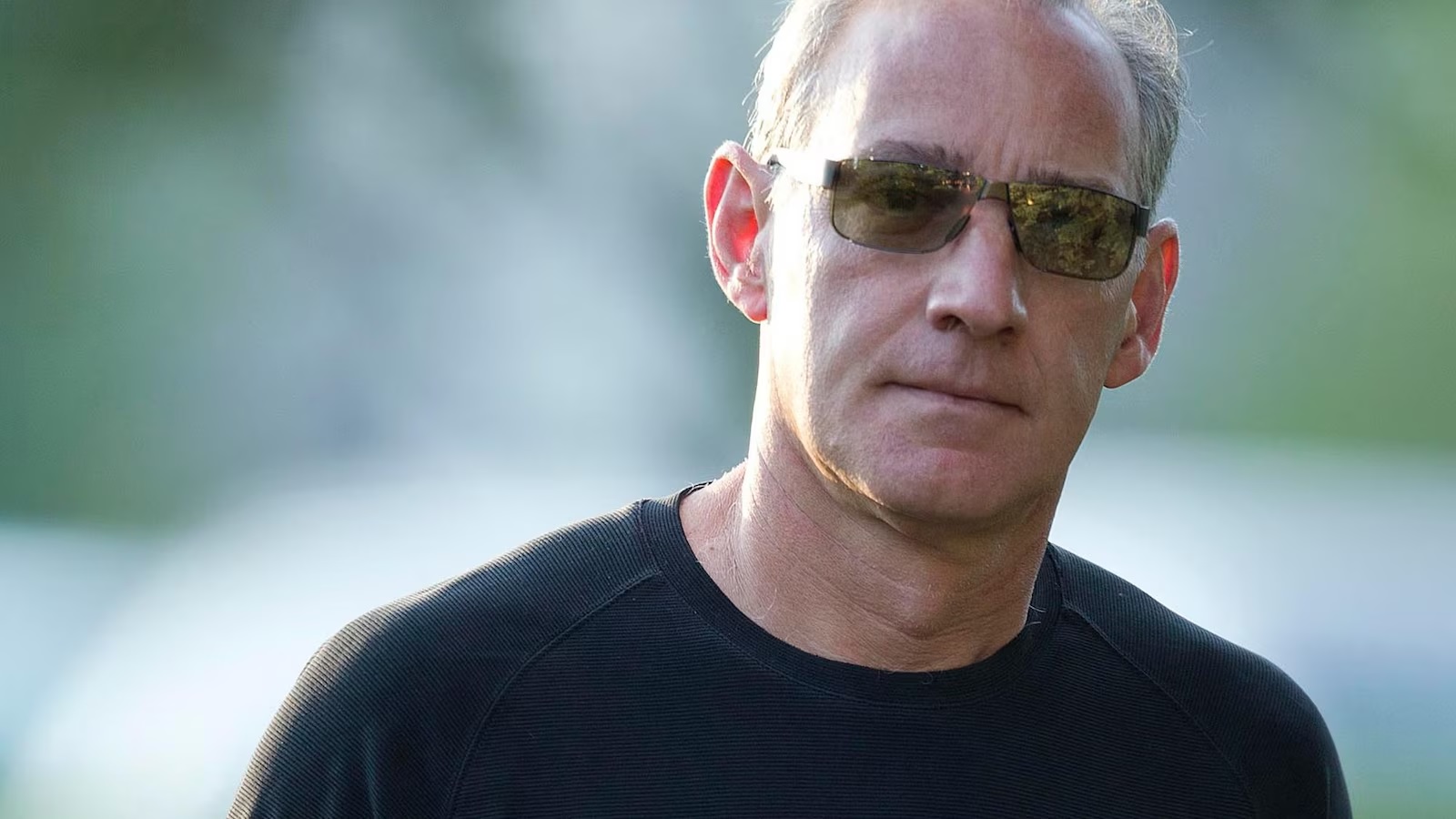
Breaking News: Finally getting relieved as CEO of F1 owner Liberty Media step down earlier this morning……
In a shocking announcement this morning, Greg Maffei, the long-standing CEO of Liberty Media, confirmed his resignation from the role, marking a monumental shift in the leadership of the company that owns Formula 1. Maffei, who has been at the helm since 2016, will step down effective immediately, though he will remain involved in the company’s affairs in a transitional advisory capacity. His decision to leave has set the stage for a transformative moment in the sports and media conglomerate’s history, with F1’s trajectory now under intense scrutiny.
The announcement, made via a public statement issued by Liberty Media’s headquarters in Denver, Colorado, comes after months of speculation surrounding Maffei’s future, the shifting dynamics within Formula 1, and the broader sports entertainment sector. While the departure was unexpected, it comes at a time when Liberty Media’s investment in Formula 1 is beginning to pay off handsomely, with the sport experiencing unprecedented growth in terms of viewership, sponsorship deals, and global expansion. However, it seems that the pressure of overseeing both the strategic direction of the company and the fast-paced world of Formula 1 had become overwhelming.
The Rise of Liberty Media in F1
Liberty Media’s acquisition of Formula 1 in 2017 was seen as a game-changer for the sport. The company, led by Maffei, took over from the hands of CVC Capital Partners, which had owned the sport since 2006. Liberty Media, with its vast portfolio of media assets, including SiriusXM, the Atlanta Braves, and various entertainment properties, saw Formula 1 not just as a racing series but as a brand with immense untapped potential. Maffei, a veteran of the media and entertainment industries, helped guide F1 into the digital age, focusing on expanding its global reach, modernizing broadcasting, and connecting with a younger audience through social media platforms and innovative content distribution.
One of Maffei’s most notable successes was the introduction of the F1 TV streaming service, which allowed fans to access exclusive content, live race coverage, and on-demand highlights. This was part of a broader strategy to leverage digital media to increase fan engagement, particularly in markets like North America and Asia, where Formula 1 had previously struggled to gain traction.
Under Maffei’s leadership, Formula 1 also experienced a resurgence in popularity in the United States, driven in part by the rise of the Netflix documentary series Drive to Survive, which debuted in 2019. The series, which provided behind-the-scenes access to the teams, drivers, and personalities of F1, became a massive hit in the United States, where Formula 1 had struggled to break through. The cultural impact of Drive to Survive has been undeniable, attracting a new generation of fans to the sport and significantly boosting American viewership of F1 events. This success led to the addition of more races in the U.S., including the Miami Grand Prix and the Las Vegas Grand Prix, which is set to debut this weekend.
Maffei’s vision also helped steer Formula 1 into new markets, including the Middle East, where the sport has gained a strong foothold with races in Bahrain, Abu Dhabi, and the upcoming Saudi Arabian Grand Prix. Additionally, the sport’s commitment to sustainability through initiatives like the push toward net-zero carbon emissions by 2030 has resonated with an increasingly environmentally-conscious global audience.
The Challenges Facing Maffei
Despite these successes, Maffei’s tenure was not without its challenges. The Formula 1 community, including teams, drivers, and fans, has long been divided over Liberty Media’s approach to the sport. Some stakeholders have expressed frustration with the company’s focus on monetization and commercial interests, with critics accusing the management of prioritizing profits over the traditional racing ethos that made Formula 1 the iconic sport it is today.
Moreover, while Liberty Media’s global push has brought increased visibility to Formula 1, there have been concerns about the dilution of the sport’s heritage and its roots in Europe. The introduction of new races, some in non-traditional venues, has drawn mixed reactions. The Las Vegas Grand Prix, for example, has faced criticism from traditionalists who feel that the glamour and spectacle of the event come at the cost of the racing itself. Additionally, the continuous expansion of the F1 calendar, with races being added in countries like Azerbaijan, Saudi Arabia, and Qatar, has raised questions about the sustainability of the sport’s growth and its impact on the wellbeing of drivers and teams.

Behind the scenes, Maffei faced pressure from investors to deliver even higher returns, and while the company’s stock price has seen significant gains under his leadership, the financial success of Liberty Media was sometimes overshadowed by the drama and tension within the sport. Reports of infighting between the governing body of F1, the FIA, and the teams themselves have added another layer of complexity to the CEO’s role.
Liberty Media’s ownership also coincided with a period of immense technological and regulatory change in Formula 1. The 2022 technical regulations, aimed at promoting closer racing and more competitive grids, introduced a number of new challenges for the sport’s governing body. Maffei and his team had to navigate the complex landscape of technical innovations, cost caps, and the balancing act between innovation and traditional racing values.
Who Will Replace Maffei?
As of this morning, no immediate successor to Maffei has been named, though industry insiders have speculated that Liberty Media will likely promote from within the company or seek an individual with deep experience in sports management and media. The transition is expected to be a carefully planned process, given the stakes involved in maintaining the momentum that Liberty Media has generated with Formula 1.
One of the names that has been floated as a potential replacement is Stefano Domenicali, the current CEO of Formula 1, who took over the role in 2021 after the departure of Chase Carey. Domenicali, a former Ferrari team principal and a highly respected figure in the motorsport community, has been instrumental in overseeing the day-to-day operations of F1. His deep understanding of the sport’s inner workings and relationships with key stakeholders could make him a natural fit to take on an expanded leadership role at Liberty Media. However, some believe that a fresh face with a background in media and global sports might be more in line with Liberty Media’s future strategy.
Another possibility is that Liberty Media may look outside the traditional motorsport world to find a new CEO. Given the company’s focus on expanding its media reach, there could be a desire to bring in someone with a background in digital media, broadcasting, and global entertainment, areas in which Maffei had vast experience. In this case, the new CEO would likely face a delicate balancing act between continuing Liberty Media’s aggressive global expansion and ensuring that the sport’s core values remain intact.
The Impact on Formula 1’s Future
Maffei’s resignation raises important questions about the future of Formula 1, particularly regarding how the sport will continue to evolve under new leadership. While it is clear that Formula 1’s global reach has expanded significantly in recent years, the sport’s traditional European base remains its heart and soul. Maintaining this balance will be key to ensuring that the sport does not lose sight of what makes it unique.
Liberty Media has already invested heavily in the sport’s infrastructure, with new race tracks, state-of-the-art broadcasting facilities, and a revamped digital strategy all contributing to F1’s continued growth. However, this is only part of the equation. For F1 to maintain its position as one of the world’s premier sports, the leadership must also address ongoing concerns about the sustainability of the sport, both in terms of the environment and its long-term commercial health.
One of the major challenges for the next CEO will be to find ways to increase diversity and inclusivity within Formula 1. While there have been some positive steps in recent years, such as the establishment of the F1 Academy to promote female drivers and initiatives to bring in new fans from different backgrounds, much work remains to be done in making the sport more accessible and representative of the global fanbase it serves.
Another critical issue will be the ongoing push to make Formula 1 more sustainable. As part of Liberty Media’s broader strategy, the sport has committed to achieving net-zero carbon emissions by 2030. This ambitious goal will require close collaboration with teams, suppliers, and race organizers, and it remains to be seen how the new leadership will approach these challenges.
A Historic Moment
Greg Maffei’s resignation as CEO of Liberty Media represents the end of an era. His leadership has been marked by both visionary successes and controversial decisions, but there is no denying that he has played a pivotal role in shaping the modern landscape of Formula 1. Under his guidance, the sport has evolved from a niche motorsport into a global entertainment powerhouse, and Liberty Media’s strategic direction has had a lasting impact on both F1 and the wider sports industry.
As the search for Maffei’s successor begins, all eyes will be on the future direction of Liberty Media and its flagship sports property, Formula 1. The sport’s increasing popularity, coupled with its expanding global presence, presents both opportunities and challenges for the next chapter in its history. Whether the new CEO will continue Liberty Media’s current trajectory or chart a new path forward remains to be seen, but one thing is clear: the next few years will be crucial in determining how Formula 1 navigates the rapidly changing landscape of global sports entertainment.
This breaking news signals a turning point for Liberty Media and Formula 1, and the world will be watching
closely as the next phase of leadership unfolds.





